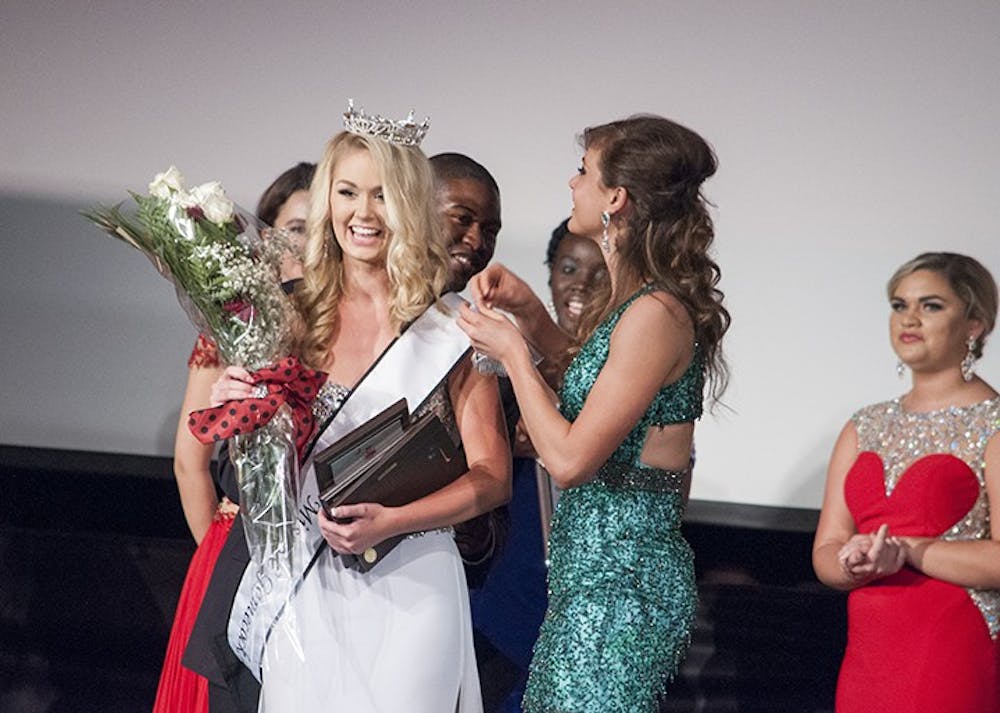The Gamecock Pageant Club hosted their first scholarship pageant on Monday evening in the Russell House ballroom.
According to their webpage, the Gamecock Pageant Club serves to bring scholarships to students through pageantry. They promote the enhancement of contestants’ interviewing, leadership and networking skills as well as service to others.
The pageant had a successful turnout, being the first USC pageant in thirty years. Katie Turner, first-year broadcast journalism student, was crowned as the new Miss South Carolina Gamecock.
Byron Thomas, fourth-year public relations student and organizer of the pageant said his goal was to give the contestants a chance to represent USC in a positive way and provide scholarship funds to those contestants.
“The stuff you don’t see, the hard work and dedication [the contestants] put into it, the confidence they gain from it, all helps them later on,” Thomas said.
The pageant, however, did not go without protest. Some students actively demonstrated against the pageant's exclusion of trans people from participating in the event.
The driving force behind the protest was the discrimination against trans students at USC from activities and organizations like fraternities and sororities, pageants and other typically gendered events.
Caleb Coker, fourth-year music education student and Communications Director of Individuals Respecting Identities and Sexualities (IRIS), led the protest.
“There is a nondiscrimination policy in place in Title 9 under which we’re protected, but it doesn’t pertain to events. It pertains to student organization membership, but not to events,” Coker said. “There are things in the works to reinterpret that. Most student organization events aren’t gendered at all ... so that’s why we don’t see it as blatantly. In things that are meant for men and things that are meant for women, usually trans people are not included, or if they are included, it’s part of a joke."
Signs displayed at the protest read, “Silence Is Death,” to place emphasis on the lack of support that comes from people remaining silent or neutral in the midst of discrimination or harassment of trans individuals.
The social movement, while focused primarily on the rights of trans students, was backed and encouraged by other student allies. Clarie Randall, third-year biology and psychology student and President of the Feminist Collective, was such a one.
“I think that being trans-exclusionary is not just inherently wrong ... but it’s also going out of fashion,” Randall said. “The more you exclude people from your organizations and groups, the more people will get angry at you. If you are living in this rooted sense ... of a gender binary, and only inviting people that exist within that gender binary ... to participate ... then you will hopefully soon enough be out of the loop.”
The protesters stood outside the entrance to the pageant and handed fliers to those who would attend. The fliers noted the forms of discrimination that trans students face on campus, including a lack of gender-neutral restrooms, daily harassment and little to no spiritual support.
After the pageant, Thomas acknowledged the protesting proceedings.
“I respect the organization and all those who are protesting. I’m a big believer in the First Amendment,” Thomas said.
Students who did not participate in the protest still acknowledged trans exclusion in campus and everyday life. Among them was Clay Armstrong, third-year international studies student.
“It’s difficult when [trans students] are in a situation where they are not allowed to participate in something that reflects their identity,” Armstrong said. “We have to decide as a society what values we want to reflect. And I think that that movement, if they’re advocating for the inclusion of trans individuals, that’s probably something I would support.”
The Miss SC Gamecock Pageant is a “feeder pageant,” which means the winner goes on to participate at higher levels such as Miss South Carolina and Miss America. Thomas aimed to abide by the rules and regulations of those other organizations, which exclude trans people from participating.
"We’re not discriminating against people. It’s not like we don’t want them to do it, but we want our organization to be a feeder system for the bigger pageant,” Thomas said.
Coker made a point to negate the idea that protesters encouraged people not to attend the pageant, or blocked the entrance to the pageant.
“We are not attacking and did not attack the Gamecock Pageant Club. Trans people are excluded from participation in events all the time,” Coker said in a Facebook post. “As long as trans people are excluded from participation in events ... I will continue to make noise and disrupt those who sit comfortably in their privilege.”

